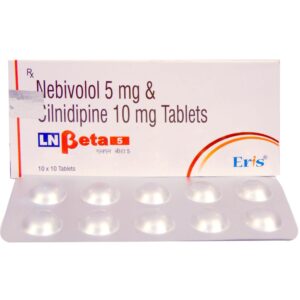NEBIVOLOL + CILNIDIPINE
Nebivolol: Nebivolol is a medication that belongs to a class of drugs called beta-blockers. It is primarily prescribed for the treatment of high blood pressure (hypertension). Nebivolol works by blocking the effects of certain chemicals in the body, such as adrenaline, on the heart and blood vessels. This leads to a decrease in heart rate and blood pressure, resulting in a relaxation of blood vessels and improved blood flow.
The usual starting dose of Nebivolol for hypertension is 5 mg once daily. The dose can be increased to 10 mg once daily if necessary and as directed by a healthcare professional. It is important to follow the prescribed dosage and not exceed the recommended amount.
As with any medication, Nebivolol may cause some side effects. Common side effects may include fatigue, dizziness, headache, nausea, and diarrhea. Some individuals may experience sexual dysfunction such as decreased libido or difficulty achieving an erection. It is essential to notify a healthcare provider if any side effects occur, as they may need to adjust the dosage or recommend an alternative medication.
Nebivolol may interact with other medications, so it is crucial to inform the healthcare provider about all current medications, including supplements and over-the-counter drugs, before starting Nebivolol. It is not recommended to suddenly stop taking Nebivolol without consulting a healthcare professional, as it may lead to a rebound effect and potentially hazardous consequences.
Overall, Nebivolol is an effective medication for the treatment of high blood pressure, helping to reduce the workload on the heart and improve blood flow. However, it is important to regularly monitor blood pressure and attend follow-up appointments to ensure its effectiveness and manage potential side effects.
Cilnidipine: Cilnidipine is a calcium channel blocker medication used primarily for the treatment of hypertension (high blood pressure) and angina (chest pain). It belongs to the dihydropyridine class of calcium channel blockers.
The mechanism of action of Cilnidipine involves blocking the L-type calcium channels in the smooth muscles of blood vessels. By doing so, it reduces the inflow of calcium ions into the cells, leading to vasodilation and relaxation of the blood vessels. This results in a decrease in peripheral vascular resistance and ultimately lowers blood pressure.
The usual starting dose of Cilnidipine is 5 mg taken once daily. The dose may be increased to 10 mg once daily if necessary. It is important to follow the dosage instructions provided by the healthcare provider.
Like most medications, Cilnidipine may cause certain side effects. Common side effects include headache, dizziness, flushing, edema (swelling), palpitations, and gastrointestinal disturbances such as nausea and abdominal pain. Some individuals may also experience muscle pain or weakness, increased heart rate, and allergic reactions such as rash or itching. If any adverse effects are experienced, it is important to consult a healthcare professional.

